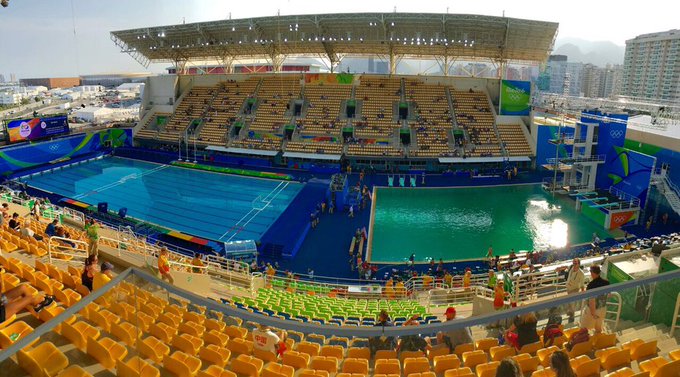By Jillian MacMath, AccuWeather.com Staff Writer
August 10,2016; 8:05PM,EDT
The water was crystal clear during events on Monday but had seemingly transformed overnight.
"The water quality at the Maria Lenk Aquatics Centre was tested and there were no risks for the athletes," officials tweeted on Tuesday.
The local organizing committee announced on Wednesday that the color change was due to an algal bloom caused by heat and a lack of wind at the centre.
Rio spokesman Mario Andrada said the green was caused "by a proliferation of algae," according to the Associated Press.
Algae thrives in warm waters and skies were sunny with high temperature of 81 F (27 C) in Rio de Janeiro on Tuesday afternoon.
It remained unclear as to why the bloom did not affect the adjacent pool used for water polo.
The Olympic Committee said the color of the diving well would be back to its normal color on Wednesday.
Though organizers did not reveal the diving well's water temperature on Tuesday, Olympic pools are supposed to be kept at a temperature of 79 F (26 C).
Despite concern from some competitors, events went on without a hitch on Tuesday.
Canadian divers Meaghan Benfeito and Roseline Filion said they were trying not to laugh at the conditions as they stood on the podium before competing.
RELATED:
Rio 2016: Rain, wind force additional delays for Wednesday events
Battling the elements: How weather has played a role during past Summer Olympics
Why weather is everything in an Olympic windsurfer's quest for gold
"The only thing we said is don't open your mouth in the water, just in case," Benfeito said.
The pair took the bronze medal in the 10m synchronized diving event.
Ermmm...what happened?!
"Typically, when we see water that goes from, let's say, clear blue to a cloudy green, that's usually an algae problem," Shawn Derosa, director of aquatics at Penn State University, told AccuWeather.
"Typically, if a pool is properly chlorinated, algae doesn't set in. So the question is, leading up to the Olympics, what were the chemical levels, what were the chlorine levels of this pool," Derosa said.
Temperatures will be on the rise as women's and men's 3mm springboard events take place. Highs could approach the 80-degree Fahrenheit mark (26 C) on Saturday.


No comments:
Post a Comment